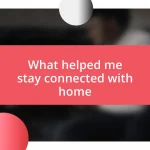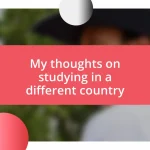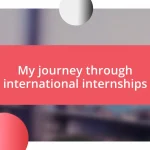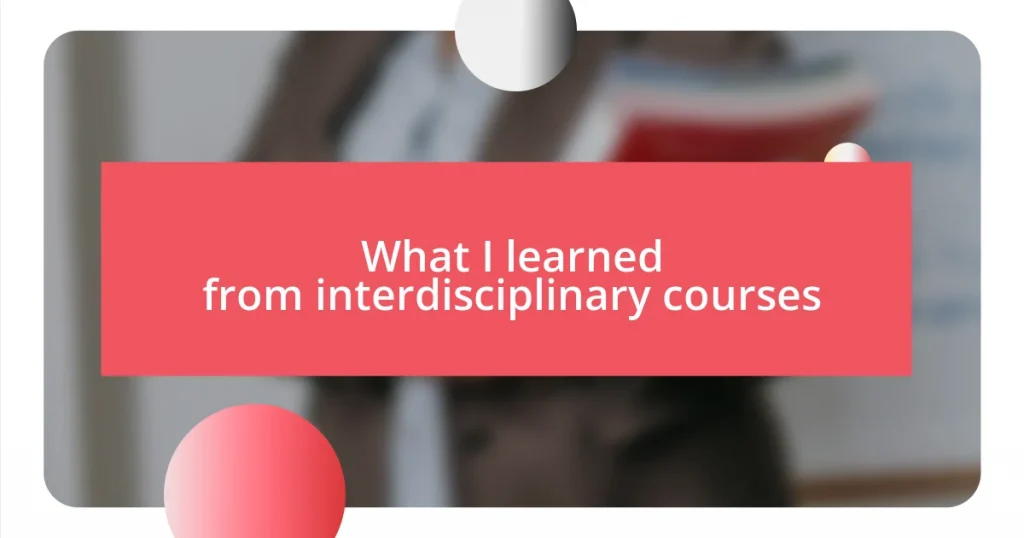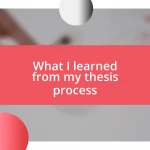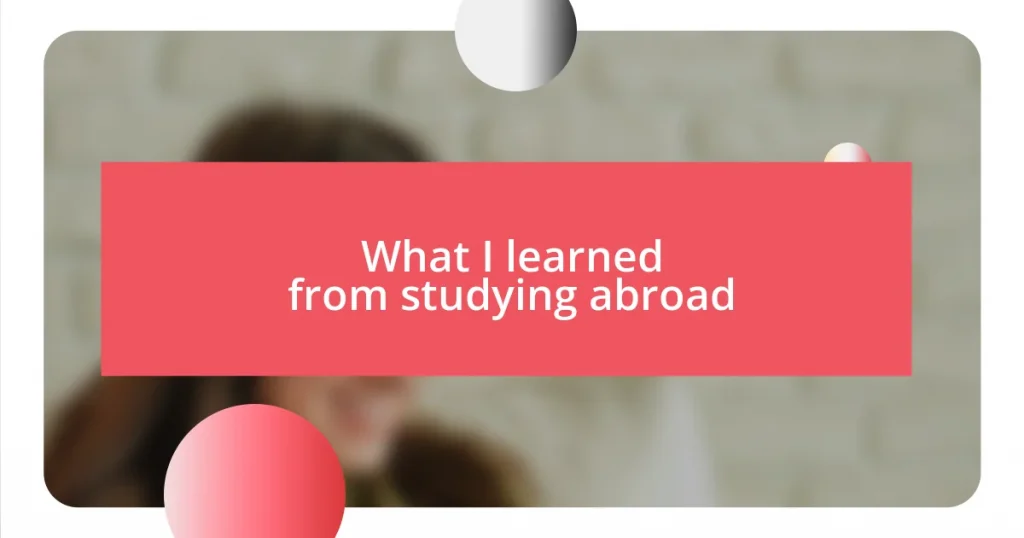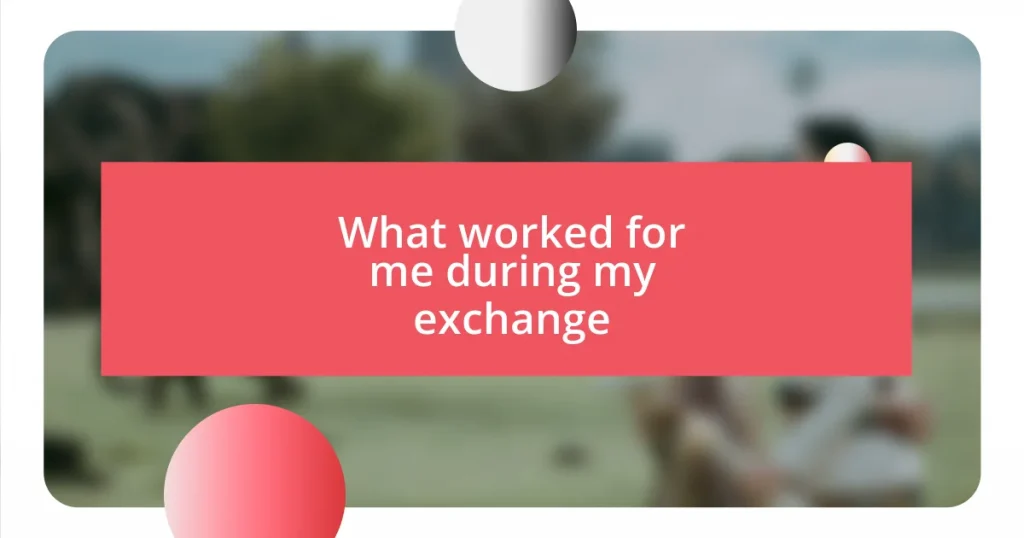Key takeaways:
- Interdisciplinary learning enhances critical thinking and problem-solving by incorporating diverse perspectives, leading to innovative solutions.
- Collaboration across various fields fosters effective communication and teamwork, enriching personal understanding and generating impactful outcomes.
- Engagement in interdisciplinary projects opens future opportunities, especially at the intersection of technology, science, and public policy, driving meaningful change in society.
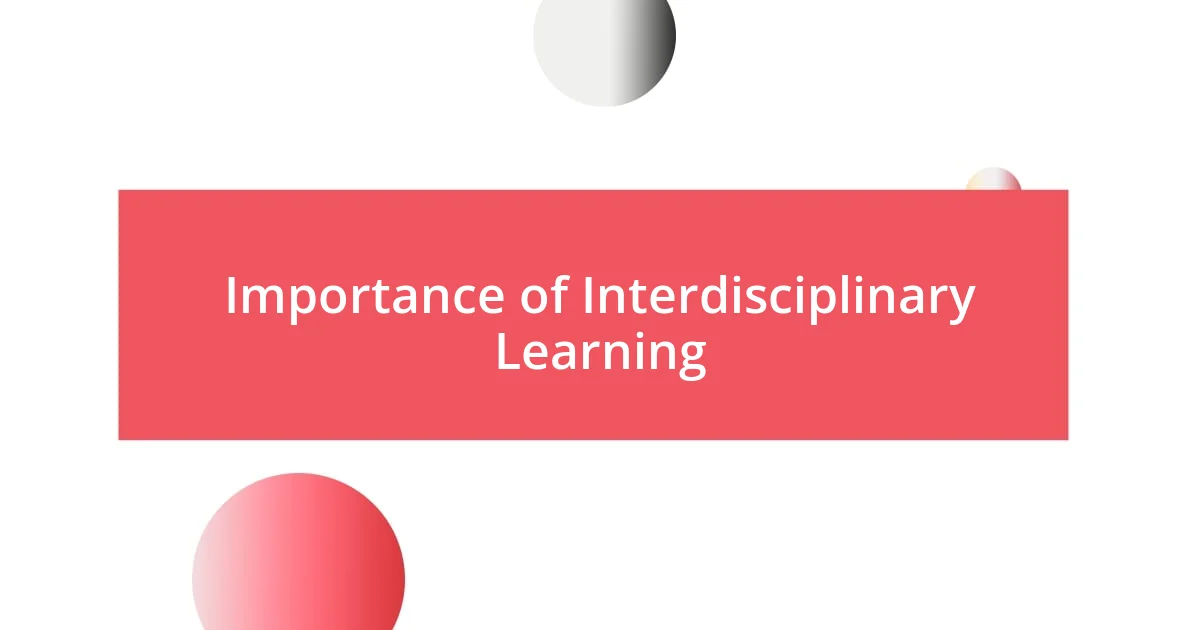
Importance of Interdisciplinary Learning
Interdisciplinary learning opens up a world of connections. I remember taking a course that blended psychology and environmental science. It made me realize how our emotional responses to landscapes can influence conservation efforts. How often do we think about the emotional side of science? This blend of perspectives can lead to innovative solutions we might not consider otherwise.
When I first dipped into an interdisciplinary project, I wasn’t sure what to expect. Working alongside peers from different fields sparked unexpected conversations that transformed my understanding of problem-solving. It’s like a puzzle; combining pieces from varied disciplines often reveals a clearer picture. Don’t you think that the richness of human experience deserves to be explored from multiple angles?
Moreover, interdisciplinary learning cultivates critical thinking and adaptability. I’ve found that when I approach a problem from different disciplinary lenses, my ability to think outside the box significantly improves. Have you ever faced a challenge that seemed insurmountable until you looked at it from a different perspective? This skill is essential in today’s fast-paced world, where complex problems require multifaceted solutions.
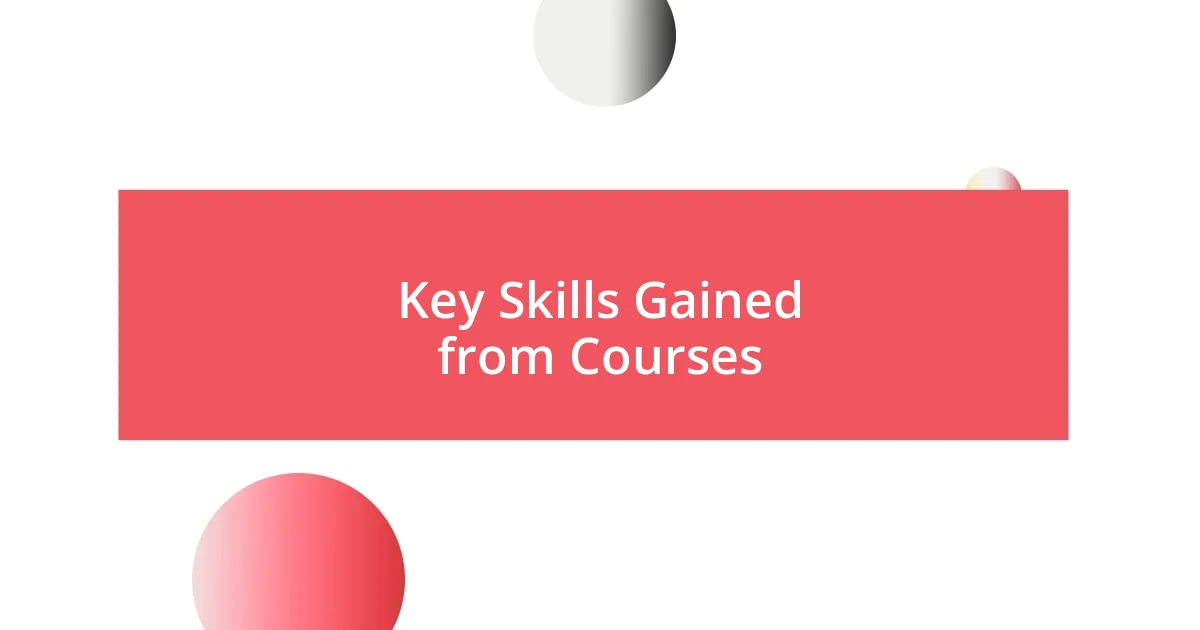
Key Skills Gained from Courses
Interdisciplinary courses have honed my ability to communicate effectively across diverse groups. I recall a project where I had to present our findings to both scientists and artists. It pushed me to simplify complex data into relatable stories that resonated with everyone. That experience was enlightening; it taught me that the essence of communication lies in understanding your audience. Have you had moments where you had to tailor your message for different listeners?
Another skill I gained is enhanced teamwork. Collaboration with students from various disciplines challenged me to adopt different working styles and approaches. I remember a late-night brainstorming session during a group project where the synergy was electric. Ideas flowed freely, each person contributing unique insights that none of us could have achieved alone. Does it surprise you how varied perspectives can bring out the best in a team?
Lastly, I developed analytical skills that transcend traditional boundaries. Throughout my courses, I became proficient in combining qualitative and quantitative analyses. One project required me to analyze social trends alongside statistical data, revealing patterns I wouldn’t have identified otherwise. This dual approach deepened my appreciation for multi-dimensional analyses. How do you think blending qualitative and quantitative insights can enhance decision-making?
| Key Skill | Description |
|---|---|
| Communication | Ability to convey complex ideas to varied audiences. |
| Teamwork | Improved collaboration with people from different backgrounds. |
| Analytical Skills | Integration of qualitative and quantitative analysis for deeper insights. |
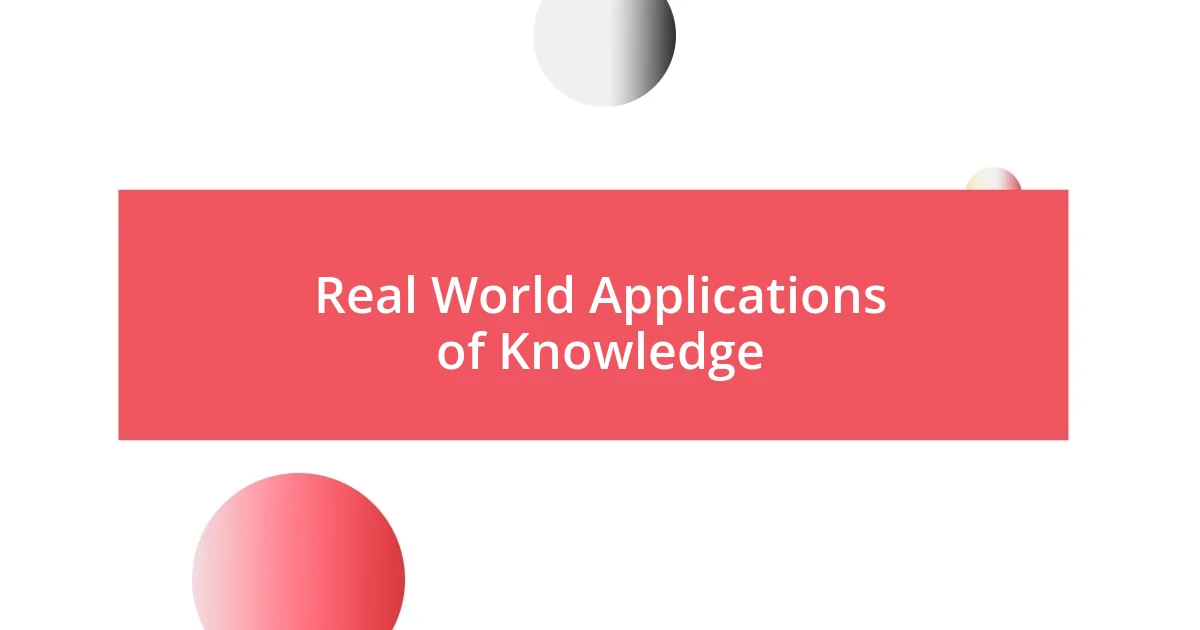
Real World Applications of Knowledge
Real-world applications of knowledge gleaned from interdisciplinary courses often lead to impactful solutions that can be implemented in various settings. I remember a community project where we combined elements of sociology, public health, and urban planning to tackle issues of food deserts in our city. This experience was empowering; seeing how our combined expertise allowed us to propose simpler, yet more effective ways to improve access to fresh produce demonstrated the power of a well-rounded approach. Isn’t it fascinating how diverse perspectives can illuminate problems we thought were insurmountable?
- Enhanced Problem-Solving: Leveraging insights from different disciplines opens up avenues for innovative solutions.
- Real-World Impact: Integrating knowledge can create tangible improvements in communities and workplaces.
- Versatile Skills: The ability to apply knowledge across various contexts prepares you for unexpected challenges.
Innovation flourishes in environments where varied knowledge bases converge. In a project that tackled climate change, I collaborated with environmental scientists, business students, and policy enthusiasts. It was exhilarating to witness how a single idea could evolve into a multifaceted approach with contributions from each field. Engaging in such diverse dialogues not only enriched my understanding but also stirred my passion for sustainable practices thinking collaboratively can pave the way for solutions that benefit society as a whole. Wouldn’t you agree that tapping into a broad spectrum of knowledge can unlock unprecedented possibilities?
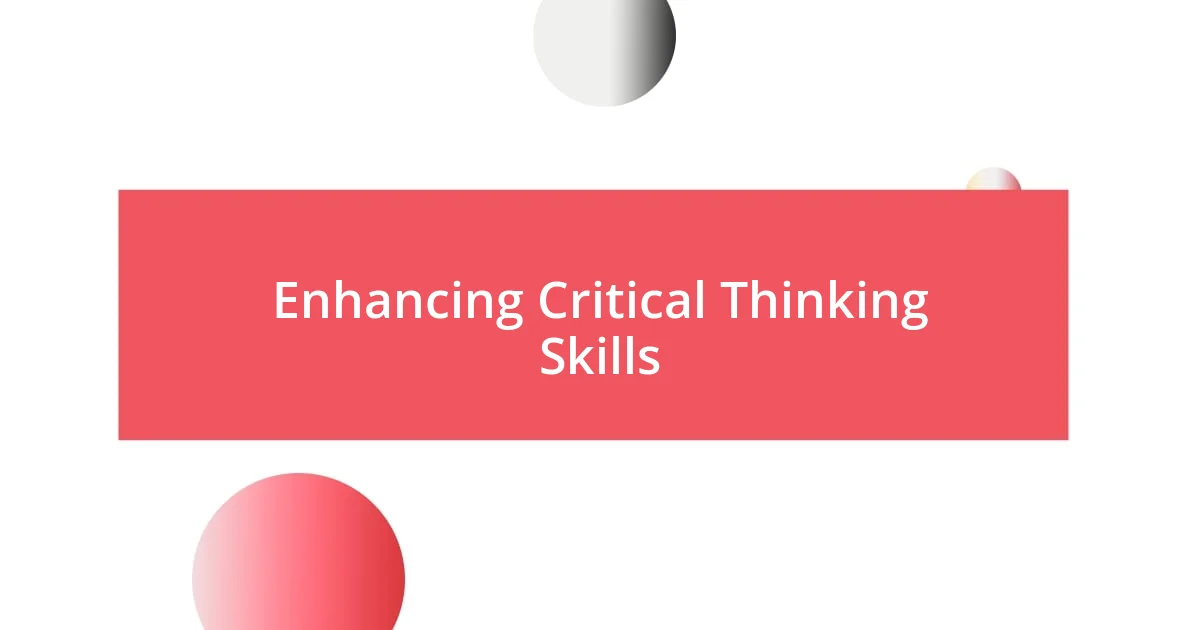
Enhancing Critical Thinking Skills
Engaging with interdisciplinary courses significantly refined my critical thinking skills. I remember one instance where we were tasked with understanding a complex environmental issue. By analyzing perspectives from science, economics, and ethics, I discovered how a seemingly straightforward question could unfold into many layers of inquiry. This realization made me appreciate the depth that diverse viewpoints bring to problem-solving. Have you ever found yourself looking at a challenge from multiple angles?
Another noteworthy moment came during a debate where I had to defend a position outside my field of study. It was daunting at first, but I found that I could connect arguments using insights gleaned from other disciplines. This clash of ideas not only sharpened my reasoning but also taught me the importance of adaptability in discourse. I couldn’t help but feel invigorated; don’t you think embracing different viewpoints can enrich our understanding?
Interdisciplinary learning constantly challenged me to reassess my assumptions. I recall an instance where we examined social issues through various lenses—psychology, sociology, and economics. Evidence and theories from these fields often contradicted my initial beliefs, forcing me to rethink my stance. By continuously questioning and refining my perspectives, I’ve grown more open-minded and resilient. Isn’t it empowering to recognize how evolving thoughts can lead to deeper insights?
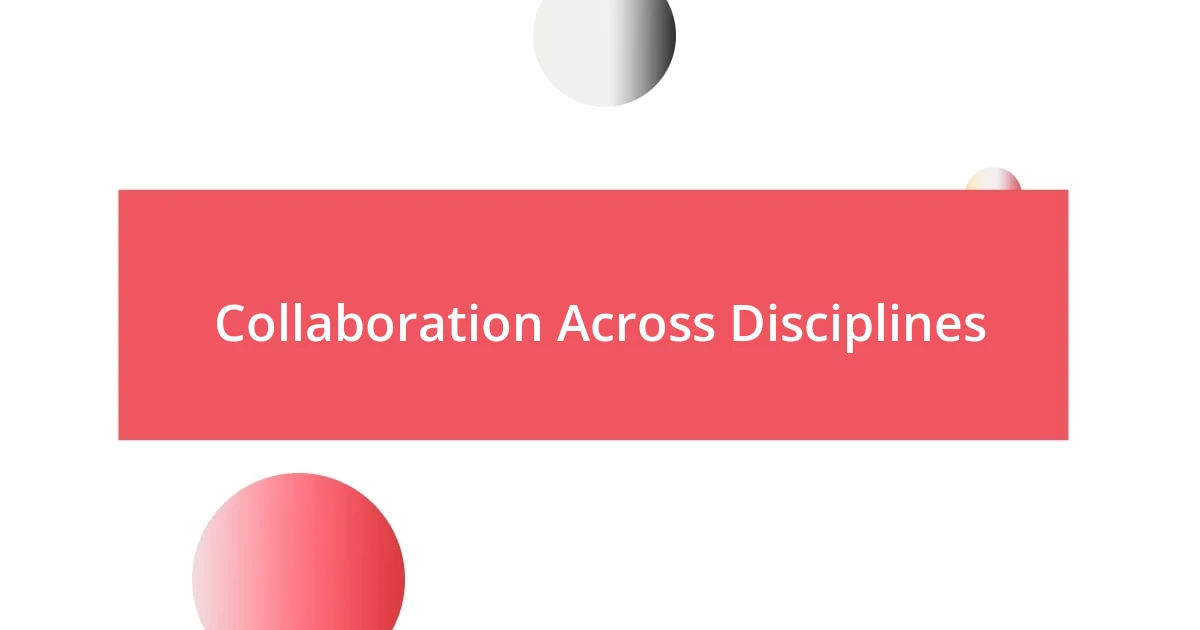
Collaboration Across Disciplines
Collaborating across disciplines brings a refreshing dynamic that completely transforms the way I approach problems. I recall a project where artists, engineers, and psychologists united to design an interactive exhibit aimed at raising mental health awareness. Each meeting was a blend of creative ideas and technical solutions, which sparked a sense of excitement. Have you ever felt that rush when different perspectives come together to create something impactful? That collaboration not only enriched my viewpoint, but it also cultivated a deeper understanding of the subject matter.
In another instance, while working on a tech-focused initiative, computer science and communication students teamed up to develop a user-friendly app for elderly users. As we engaged in discussions, it was fascinating to witness how our different backgrounds shaped the functionality we prioritized. Listening to my peers’ insights made me realize the importance of empathy in technology design. It’s incredible how collaboration can lead us to consider diverse user experiences that we might overlook in isolation. Can you imagine the potential when we all contribute our unique strengths?
There was a moment during a cross-disciplinary workshop focused on urban development when I observed how urban planners and sociologists dissected the same data in vastly different ways. I felt a sense of awe witnessing the emergence of layers of meaning we couldn’t have seen alone. This experience ignited a passion in me for integrative thinking. Isn’t it remarkable how working together not only produces innovative ideas but also fosters mutual respect and understanding among fields? Exploring these connections has truly deepened my appreciation for the interconnectedness of knowledge.
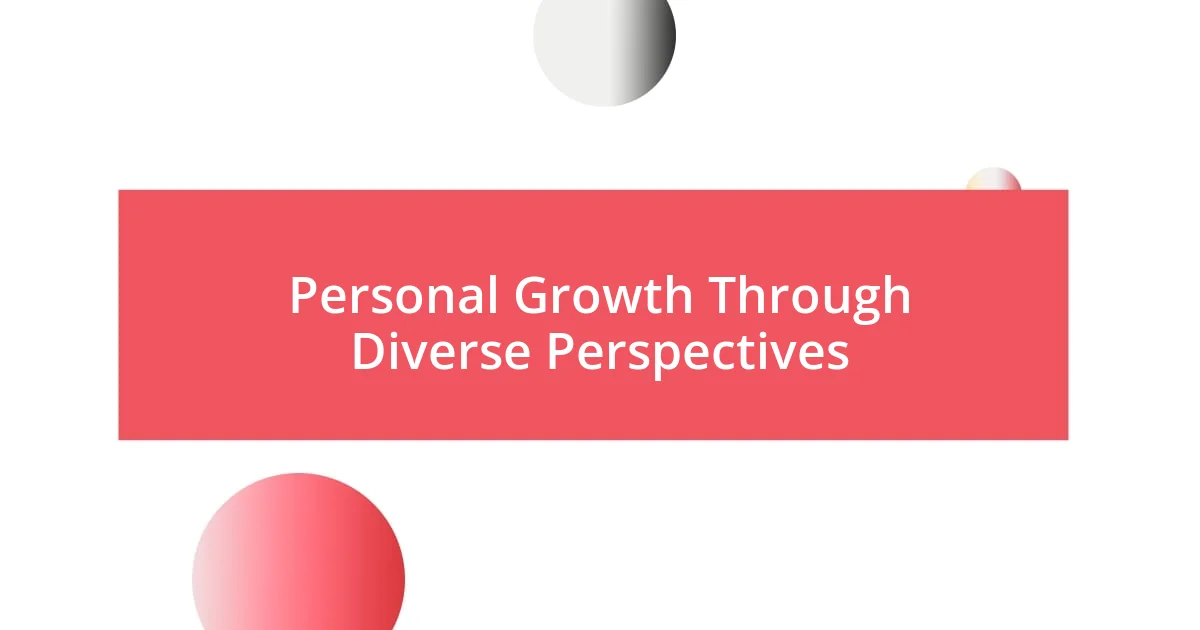
Personal Growth Through Diverse Perspectives
Diving into interdisciplinary courses has been a journey of personal growth that I never anticipated. For instance, during a group discussion on climate change, I found myself interacting with biology and political science students. Their insights about the impact of policy decisions on ecosystems expanded my understanding significantly. It was an eye-opener for me—how can we dismiss the importance of governance when tackling scientific issues? This intersection of ideas pushed me to broaden my horizon and consider solutions in a much more holistic manner.
One memorable instance came from a workshop where we explored cultural influences in literature and psychology. Sharing my thoughts on storytelling felt exhilarating, but listening to others intertwine their perspectives from different fields was truly enlightening. Their interpretations challenged my own and ignited a sense of curiosity within me. I realized then that embracing diverse perspectives doesn’t just enrich discussions; it cultivates a sense of empathy. Isn’t it fascinating how stepping into someone else’s shoes can reshape our views?
I also remember working on a community project that combined sociology and environmental science to foster sustainable living practices. Hearing firsthand accounts from community members about their struggles made the data we were analyzing come alive in a whole new way. This fusion of facts and personal stories highlighted the importance of looking beyond statistics. It drove home the concept that every perspective matters in crafting effective solutions. Have you ever felt that powerful connection between data and real human experiences? That’s where true understanding and growth begin.
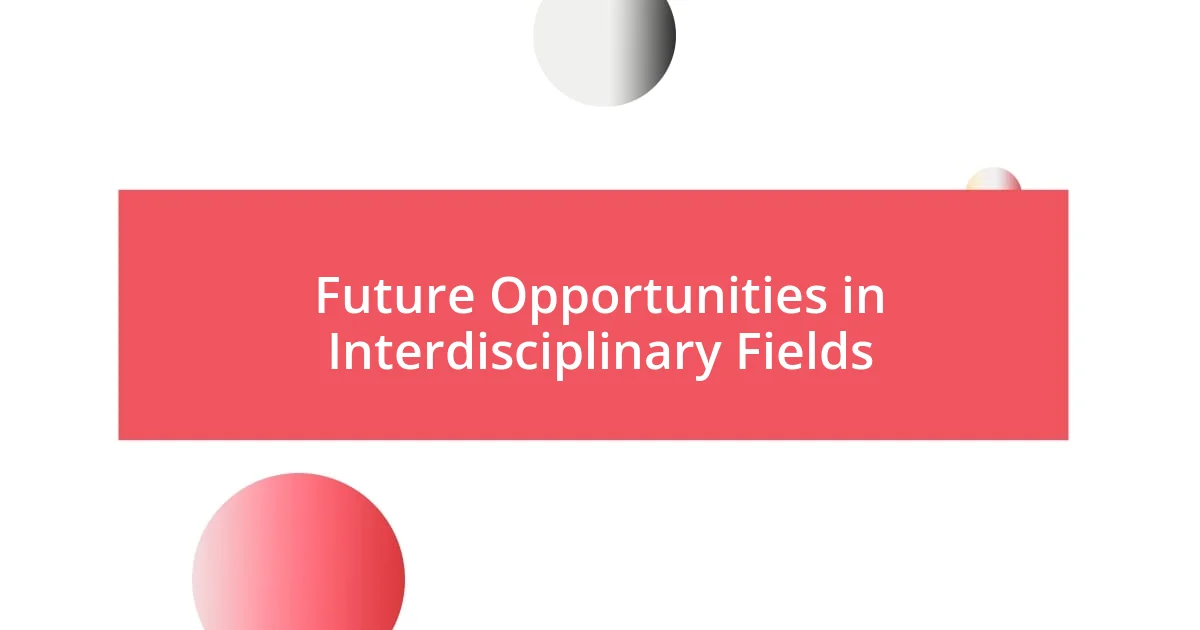
Future Opportunities in Interdisciplinary Fields
Interdisciplinary fields are blossoming with future opportunities that I find incredibly exciting. For example, I once attended a conference focused on tech and healthcare innovations. I noticed a significant number of startups emerging at this intersection, driven by the need for better patient care through technology. Have you ever thought about how data science is revolutionizing medicine? Platforms that use data analytics to predict patient outcomes can reshape healthcare delivery, and being involved in such projects feels like being at the forefront of something monumental.
Additionally, there’s a growing demand for professionals who can bridge gaps between environmental science and public policy. I participated in a campaign aimed at promoting sustainable initiatives in my community, and I saw firsthand how crucial it was to communicate scientific findings to policymakers in relatable ways. Isn’t it powerful to realize how one can impact decisions that affect entire ecosystems? Those who can navigate both worlds not only enhance their career prospects but also drive meaningful change.
As industries continue to evolve, creative thinking will remain vital. I remember a collaboration project focused on renewable energy, where artists and scientists worked together to visualize energy consumption through art installations. The experience highlighted for me that creativity isn’t reserved for just one field; it can fuel innovations and solutions across disciplines. What if the future is a place where art and science not only coexist, but also thrive together? Engaging in such interdisciplinary endeavors opens endless possibilities for growth and transformation.




